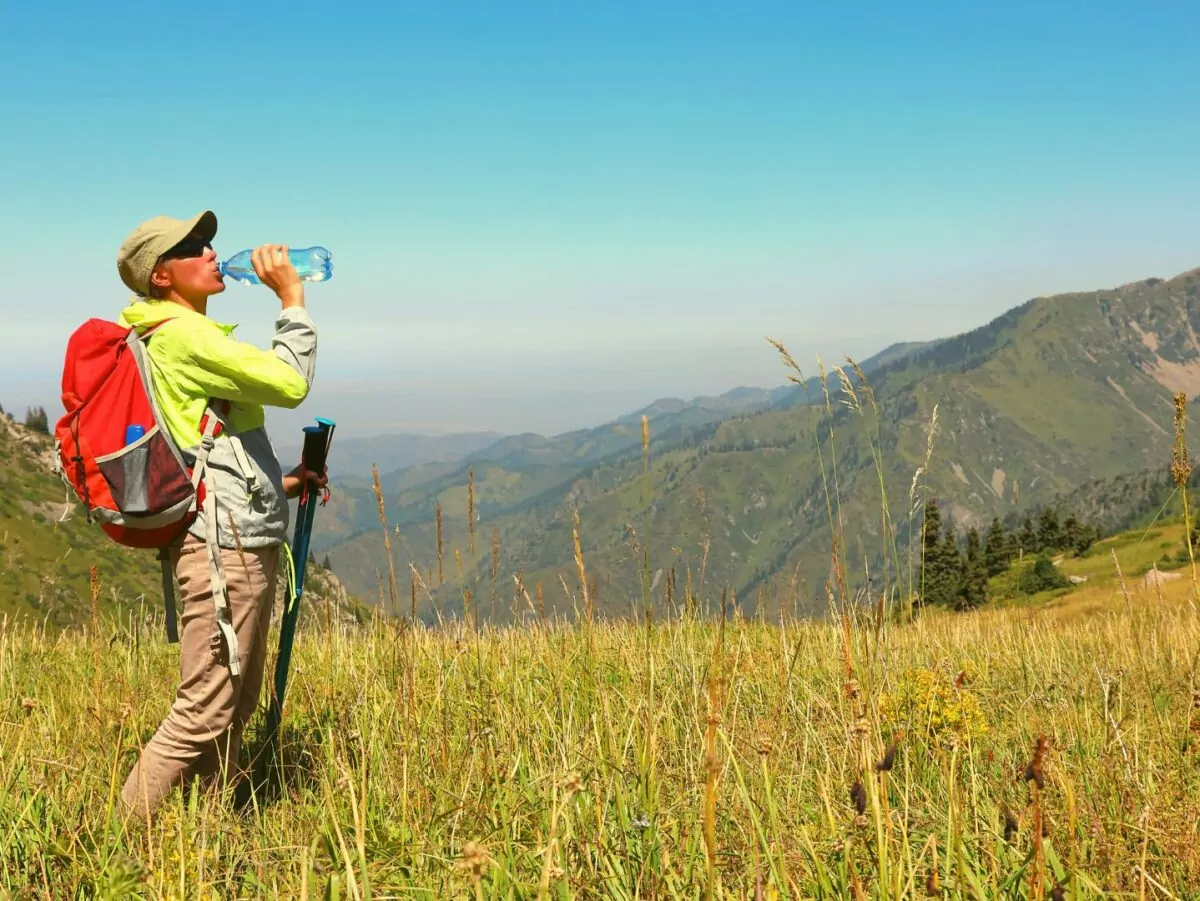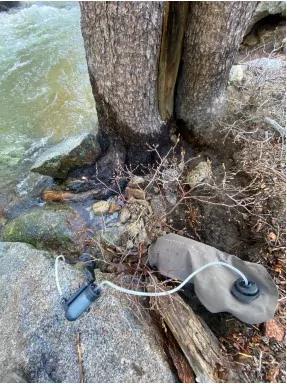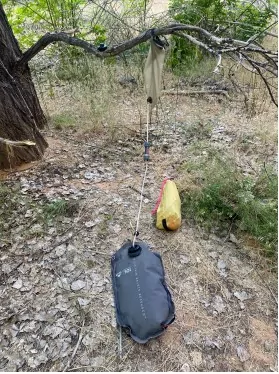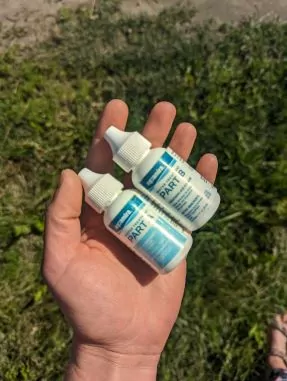Backcountry Water Purification

Water purification is a crucial consideration when venturing into the backcountry. Contaminated water can harbor pathogens and impurities that pose significant health risks. To ensure a safe and reliable water supply, outdoor enthusiasts rely on various methods of purification, including pump water filters, gravity filters, and chemical filtration. This article aims to provide a comprehensive comparison of these three techniques, with pump water filters being the preferred choice and chemical filtration serving as a last resort backup method.
Pump Water Filters
Pump water filters are widely regarded as the go-to method for water purification in the backcountry. These filters utilize a hand pump mechanism to draw water through a series of filters, effectively removing impurities such as bacteria, protozoa, and sediment.
Let’s explore the characteristics of pump water filters in more detail: 
- Speed and Efficiency – Pump filters offer rapid water purification, allowing users to access clean water quickly, even from turbid sources. The pumping action facilitates a steady flow rate, minimizing the waiting time for treated water. This feature is particularly beneficial when time is of the essence or when large volumes of water need to be purified.
- Versatility – Pump filters are adaptable and can handle various water sources, including lakes, rivers, and even stagnant puddles. They are designed to remove a wide range of contaminants, ensuring the water is safe to consume. This versatility provides peace of mind, regardless of the water source encountered in the backcountry.
- Durability – Pump water filters are constructed with robust materials, making them durable for extended outdoor use. They can withstand harsh conditions, accidental drops, and rugged terrains, enhancing their reliability. Their durability makes them suitable for adventurers who require a long-lasting and resilient water purification solution. That being said, freezing temperatures can cause crucial O-rings in the pump mechanism to freeze, rendering them more difficult to use. It is important to store pump filters so that they are not susceptible to freezing.
- Filter Longevity – The replaceable filter cartridges in pump water filters typically have a high capacity, allowing them to treat hundreds or even thousands of gallons of water before requiring replacement. This extended filter life makes them cost-effective in the long run, minimizing the need for frequent filter replacements during backcountry trips.
Gravity Water Filters
Gravity filters operate on the principle of using gravity to allow water to flow through a series of filters, eliminating the need for manual pumping. While they offer convenience and ease of use, they have some limitations.
Let’s delve into the key aspects of gravity filters:

- Simplicity – Gravity filters are simple to operate. Users fill the reservoir and let gravity do the work. This simplicity makes them an excellent choice for camp settings where hands-free operation is desired. They are particularly useful when engaging in other campsite tasks while water is being filtered.
- Group Use – Gravity filters excel in scenarios where large volumes of water need to be treated for a group of people. Their larger reservoir capacity and higher flow rates make them suitable for backcountry expeditions involving multiple individuals. They are ideal for sharing purified water among a group, reducing the need for individual filtration devices.
- Filter Clogging – Gravity filters are prone to clogging when used with turbid water sources or those containing high sediment content. This issue necessitates periodic maintenance and more frequent filter replacements. Users must be vigilant in monitoring the condition of the filter and regularly backflush or clean it to maintain optimal performance. Additionally, it is not recommended to backflush a filter with untreated water. This can pose a tricky scenario if your filter is clogged and you are entirely out of clean, potable water. Backflushing a filter with untreated water will render the filter useless.
Chemical Filtration
Chemical filtration involves the use of various water treatment chemicals, such as chlorine dioxide tablets or iodine solutions, to kill or neutralize microorganisms present in the water.
While effective, chemical filtration has distinct disadvantages:
- Potency and Efficacy – Chemical treatments can effectively eliminate bacteria, viruses, and protozoa. However, they may be less effective against certain cysts, such as Cryptosporidium, requiring extended contact times or higher doses of chemicals. Users must be aware of the specific pathogens present in the area they are exploring and select the appropriate chemical treatment accordingly. Additionally, chemical filtration does not remove sediment or tannins from water. This can leave your water murky or brown, which can be unappealing to some to drink. While the water may be safe to drink from a micro bacterial stand point, it will still be laden with sediment and generally unappealing.
- Taste and Odor – Chemical treatments often leave an unpleasant taste and odor in the water, which may make it less palatable. Additional steps, such as using flavor enhancing tablets or adding powdered drink mixes, may be required to mask these undesirable qualities. This aspect can impact the overall enjoyment of the drinking water during outdoor adventures.
- Wait Times – Chemical filtration involves waiting for a specific duration to allow the chemicals to fully disinfect the water. This waiting period can range from 15 minutes to several hours, depending on the specific chemical used and the water temperature. It is essential to factor in these wait times when planning outdoor activities or when there is an immediate need for clean drinking water.
- Chemical Safety – While chemical filtration is generally safe when used as directed, certain individuals may have sensitivities or allergies to the chemicals used. It is important to carefully read and follow the instructions provided with the chosen chemical treatment method to ensure proper usage and minimize any potential risks.
Our Recommendation
When it comes to water purification in the backcountry, pump water filters emerge as the preferred method due to their speed, efficiency, versatility, durability, and filter longevity. They offer reliable and effective purification, ensuring a safe water supply for outdoor enthusiasts. Gravity filters provide convenience and are suitable for group use but have limitations such as dependence on water sources and filter clogging. Chemical filtration should be considered a last resort due to taste and odor issues, wait times, and potential sensitivity concerns. Ultimately, selecting the most appropriate method depends on individual preferences, the specific requirements of the trip, and the available water sources in the backcountry.
Not quite ready to experience the backcountry alone? Try going first with a guide. Wildland Trekking offers multi-day group backpacking trips in the company of an experienced outdoor professional. Leave the planning, permits, equipment and food in their capable hands.




